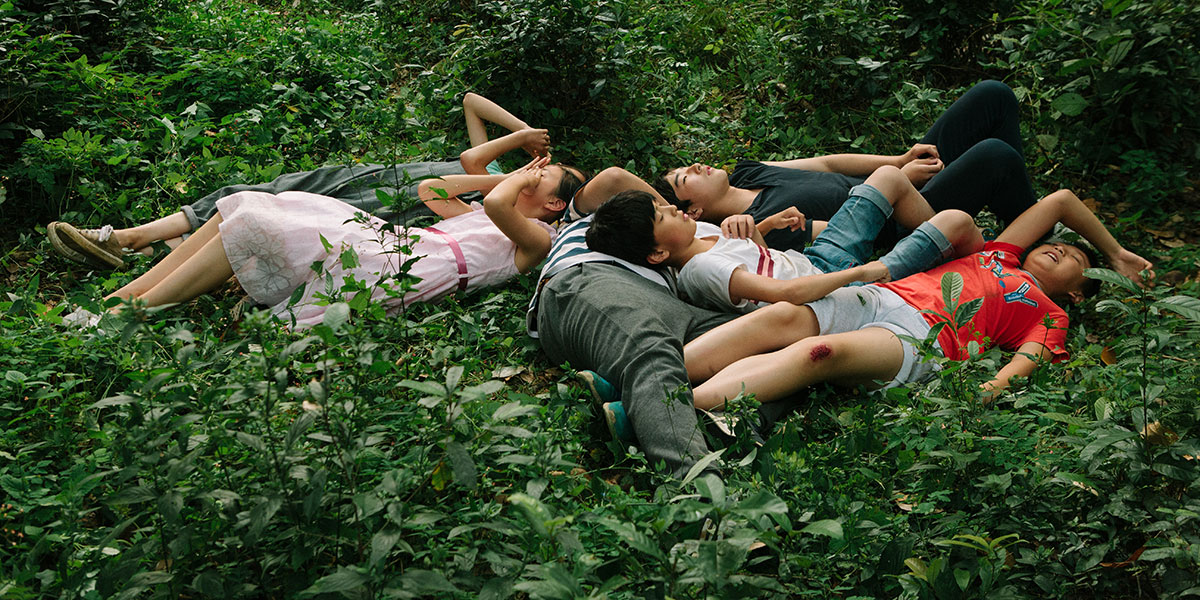Suburban Birds (Qiu Sheng, China)

By Phoebe Chen
Suburban Birds screens at TIFF Bell Lightbox on Thursday, November 14 as part of MDFF Selects: Presented by Cinema Scope and TIFF.
In the grip of this terrestrial life, nothing works so well as a sinkhole to bare the subterranean tremors of our weird planet. You have seen these pictures seized and dropped by the news cycle: a Dantean pit in the still of suburbia, loamy abyss where a driveway should be; an apocalyptic chasm bounded by high-rises, eating away cars, traffic lights, urban debris. Better to coax the secrets of earth’s movements before the ground buckles and falls, as a group of land surveying engineers attempt to do in Qiu Sheng’s elliptical debut feature, Suburban Birds. The film shifts between two parallel narratives whose temporal relation is never confirmed, only teased with enigmatic doubling and moments of blithe convergence. We follow the adult engineers, investigating stray clues of geological complaint while the city’s subway expansion is placed on pause; then, a group of red-kerchiefed school children, whose days span playground sojourns and classroom banalities. The main locus of mystery is a man called Xiaohao (Mason Lee), an engineer whose name is shared by a schoolboy (Zihan Gong) in the other storyline. Uncanny cues recur: early on, a woman tells the story of carrying a stray dog home, and later, the anecdote plays out almost beat for beat with one of the schoolgirls—mirrored across two lives by kismet, or folded into just one, by memory?
Both storylines seem to share a concern with the act of looking, signalled at first by the engineers and all their equipment for observing land subsidence, mired in logs of quantitative data. Against their hard mechanics of seeing, there is a wispier, allegorical thread: early on, the adult Xiaohao drops his binoculars onto a riverbank at night and later, his schoolboy counterpart finds them on a patch of grass. In the most explicit crossover, the school kids happen upon the engineers napping in the afternoon light, figures fanned around a lone yellow total station as awed onlookers to a sundial. Amid stifled laughter, one of the boys presses a chewed wad of gum to the eyepiece; when we return to the same scene later, the adult Xiaohao rouses himself awake and, in a cryptic echo, also spits out a piece of gum. Shots are often stylized to match a character’s use of observational tech, sometimes hazy and flared at the edges to mimic a total station viewfinder, or circled by sharp black to feign tunnelled binocular vision. There’s even a strange collapsing of perspective in the frequent use of Hong Sangsoo-style quick-zooms that intimate humour, but mostly leave scenes with ambiguous affect. So runs a playful lilt through the film’s inscrutable register, casting perspective as that linear, factual thing of our phenomenal world, but also the ineffable work of time and its gift of retrospect.
Shot in academy ratio, Qiu’s framing reminds me of a few other films that also take landscape as a central theme but forego the instinctive widescreen for something more cloistered, like Lisandro Alonso’s similarly oneiric Jauja, whose work Qiu has cited as an influence, or the tense stasis of Kelly Reichardt’s Meek’s Cutoff. Where the latter two share a milieu in the Western desert’s dispiriting sameness, Suburban Birds captures the diverse topography of an urbanizing China and the ecological harm wrought by its infrastructural spread. Suburban Birds was filmed in Hangzhou, the capital of Zhejiang province and Qiu’s hometown, whose long-exalted verdure has been lacerated by perpetual construction over the past decade, like many other wealthy coastal cities. Signposts of industry are ubiquitous throughout the film: from a balcony at home, one of the schoolgirls looks at a neighbouring vista of demolished houses that cascade into a still sea of plaster and broken stone; in a mesmerising long shot, children cut across a sunlit belt of greenery, buffeted by mounds of rubble in the foreground, and the alien protrusions of an arcing almost-bridge in the background. Metro systems and railways continue to rapidly score the country’s surface, but Hangzhou alone has already seen two fatal subway tunnel collapses, one in 2008, and the other in August this year.
Suburban Birds embeds this coherent critique of industrial distortion in the form of something more numinous. There’s no reliance on the easy nostalgia of period markers or a childhood boxed away as idyll; both storylines seem thoroughly contemporary. The whole experience feels more like playing catch-up with the wacky physics of a new dream, carrying a muffled sense of loss in a shifting terrain so vague it’s unclear if anything has changed at all. Shopping malls by rolling mountains; a strip of mansions by a rice field; suburban (even rural) China is increasingly full of these incongruous sights, as the film takes the time to show. There’s a moment when a simple trip to a classmate’s house becomes a half-day odyssey through parkland and rubble, train tracks and phantom toll booths. The children scale high walls and make riverside pit stops for birdsong; at dusk, they arrive at the edge of the water and look towards a distant cityscape, gold in the half-light. To its left is a mountain, like the mountains that used to fill my hometown, also a verdant coastal city in the southeast. When I was a kid they seemed close enough to touch from my bedroom window, bordering our apartment block with walls of sloping trees and animal sounds at night. But each time I go back, another dozen have been razed for new land, clawed at by bulldozers like so much rubble.
Phoebe Chen

